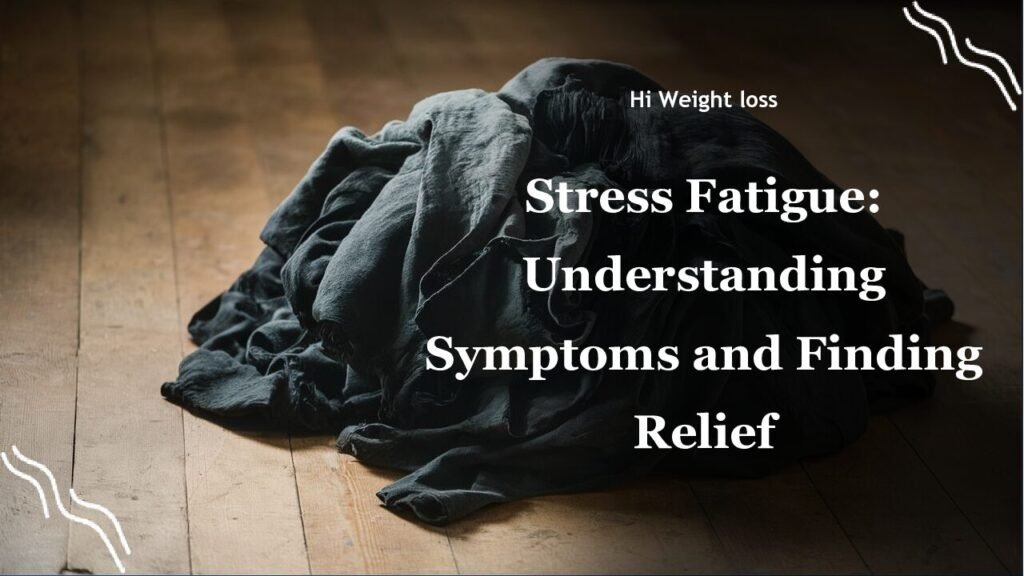“`
Do you ever feel like you’re constantly running on empty, even after a full night’s sleep? It’s like a deep-seated weariness that no amount of rest seems to fix, and everything feels like a herculean effort. This might be stress fatigue, a condition where prolonged stress takes a serious toll on your body and mind. In this article, we’ll explore the common symptoms of stress fatigue, how it feels physically, and provide actionable strategies to manage it, using real-life experiences and expert-backed advice.
What Does Stress Fatigue Feel Like?
Stress fatigue, often called stress-related fatigue, is different from the tiredness you feel after a long day. It’s a chronic lack of energy and motivation stemming from prolonged mental or emotional stress, not physical exertion. It’s more than just being tired; it’s an exhaustion that seeps into every aspect of your life. I remember a time during a particularly stressful project at work, even weekends felt exhausting, not relaxing and restorative, no matter how much sleep I got.
Physical Manifestations of Stress Fatigue
When stress fatigue hits, it doesn’t just stay in your head; it manifests in physical ways, too. According to Health Central, some of the common physical symptoms include sore muscles, headaches, and changes in appetite. It’s like your body is constantly on high alert, leading to muscle tension and discomfort.
I remember a colleague, Sarah, telling me she often had terrible headaches during her high-stress job, and she said that she was feeling constant fatigue in her body and that she felt physically exhausted. It seemed like her body was carrying the weight of her stress, making it hard for her to relax. These physical symptoms are a signal from your body that it’s struggling to cope with the prolonged stress.
Another common physical symptom is persistent tiredness that isn’t relieved by rest, which is a hallmark symptom of stress fatigue, as highlighted by Calm Blog. Have you ever found yourself sleeping for eight hours, only to wake up feeling like you haven’t slept at all? That’s a common experience with stress fatigue.

Emotional and Mental Symptoms
Beyond the physical toll, stress fatigue significantly affects our emotional and mental states. Do you often find yourself feeling more irritable or anxious than usual? Health Central points out that these are common emotional responses to chronic stress.
You might find yourself feeling overwhelmed, like you’re constantly “on,” which drains your energy, leaving you feeling worn out, as explained by Calm Blog. This constant feeling of being overwhelmed can make even small tasks seem impossible. It’s like your mental reserves are depleted.
Additionally, you might experience difficulty concentrating and a loss of interest in activities you once enjoyed. I remember my cousin, who was experiencing extreme job stress, told me that he often felt unable to focus and even activities he used to be passionate about, like playing basketball, now felt like a chore. He said he felt like a shell of his former self, unable to concentrate and unable to feel any joy.
How to Manage Stress Fatigue Symptoms
Now that we’ve explored the symptoms, let’s talk about how to manage stress fatigue. The key is to address the underlying causes of stress and adopt healthy coping mechanisms. The first step is recognizing the symptoms of stress and fatigue, as mentioned by WebMD. It helps if you understand that these symptoms are real and need to be addressed. So, do you often find yourself experiencing these symptoms?
Prioritize Rest and Sleep
Since persistent tiredness is a key symptom, focusing on getting enough quality sleep is crucial. Establishing a consistent sleep routine, creating a relaxing bedtime environment, and avoiding screens before bed can significantly improve your sleep quality. Have you tried limiting screen time before sleep? This can dramatically improve the quality of your sleep.
Manage Stress
Techniques such as mindfulness meditation, deep breathing exercises, or yoga can help reduce stress levels. One of my friends, who works in a very high-pressure environment, has told me that practicing meditation for just 15 minutes each day helps him calm his mind and feel less overwhelmed. You might want to consider exploring these techniques as well.
Regular Physical Activity
Regular exercise, even a short walk, can boost your energy levels and improve your mood. It’s like a release valve for pent-up tension. Start with something gentle and gradually increase the intensity. Have you thought about incorporating more movement into your daily routine?
Balanced Diet
Nourishing your body with a balanced diet can significantly improve your energy levels. Include plenty of fruits, vegetables, and whole grains in your meals. I personally find that when I eat better, I feel much more energized throughout the day, and so can you.
Seek Support
Don’t hesitate to reach out to a therapist or counselor if you’re struggling to manage your stress and fatigue on your own. Speaking with a professional can provide you with valuable insights and coping strategies. Sometimes, just talking to someone can make a world of difference. Are you comfortable talking about your feelings with a trusted professional?
Create a Daily Schedule
Creating a structured daily schedule can help you feel more in control and less overwhelmed. This should include time for work, relaxation, and enjoyable activities. Try time management techniques like the Pomodoro method to break down your work into manageable chunks, and you may feel less overwhelmed.
It’s important to remember that managing stress fatigue is a journey, not a destination. Be patient with yourself, and celebrate small victories along the way. Do you feel that these suggestions help?
| Symptom Type | Specific Symptoms |
|---|---|
| Physical | Persistent tiredness not relieved by rest, sore muscles, headaches, changes in appetite |
| Emotional | Irritability, anxiety, feeling overwhelmed, loss of interest in activities |
| Mental | Difficulty concentrating, slowed reflexes, difficulty making decisions |
Conclusion
Stress fatigue is a real condition that can significantly impact your quality of life. It’s characterized by persistent tiredness, physical discomfort, emotional irritability, and mental fog. The experience of my colleague, Sarah, with constant headaches and fatigue, and my cousin’s loss of joy, highlight how profoundly this condition can affect everyday life. By understanding the symptoms and actively managing your stress, you can move towards feeling more energized and engaged. Implementing strategies such as prioritizing rest, managing stress through mindfulness and meditation, regular physical activity, a balanced diet, and seeking support when needed, can help you gain control over your stress and fatigue.
Remember, overcoming stress fatigue is a journey, and there are steps you can take to feel better and reclaim your well-being. So, take that first step towards a more energized and joyful life, and remember to share this article with anyone who might be struggling with similar symptoms!
FAQ
What is the main difference between regular fatigue and stress fatigue?
Regular fatigue is usually relieved by rest, while stress fatigue persists even after adequate sleep and is often accompanied by other symptoms like irritability and difficulty concentrating.
Can stress fatigue cause physical symptoms?
Yes, stress fatigue can manifest physically through symptoms like sore muscles, headaches, and changes in appetite.
How can I manage my stress to reduce stress fatigue?
Effective strategies include mindfulness meditation, regular physical activity, a balanced diet, and seeking support from a therapist or counselor when needed.
Is it important to see a doctor if I experience symptoms of stress fatigue?
Yes, if your symptoms persist and significantly impact your daily life, it’s important to seek medical advice to rule out other potential underlying conditions and get appropriate support.
How long does it take to recover from stress fatigue?
The recovery time varies from person to person. It depends on the severity of your stress and how consistently you implement coping mechanisms. Be patient and consistent with your self-care efforts.
“`



